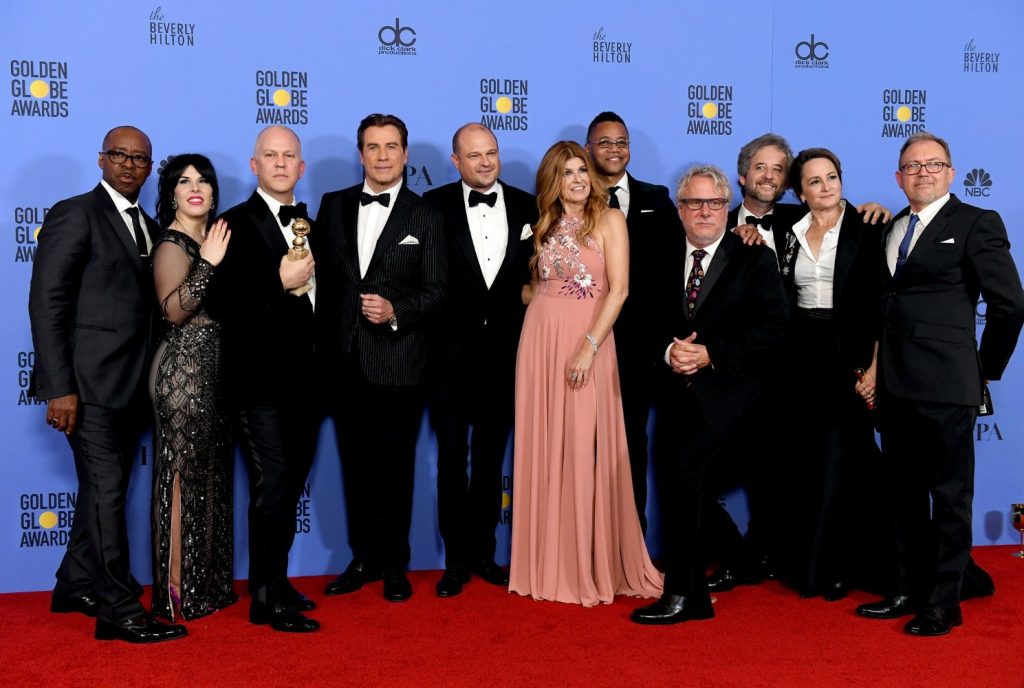American Crime Story, award shows, celebrity interviews, Golden Globe Awards, Golden Globe interviews, Golden Globes, John Travolta, Sarah Paulson, The People v. O.J. Simpson, TV
January 9, 2017
by Carla Hay
The 74th annual Golden Globe Awards took place on January 8, 2017, at the Beverly Hilton in Beverly Hills, California.
“THE PEOPLE V. O.J. SIMPSON: AMERICAN CRIME STORY”
Golden Globe wins:
- Best Limited Series or Motion Picture Made for Television
- Best Actress in a Limited Series or Motion Picture Made for Television (Sarah Paulson)
Here is what these Golden Globe winners said backstage in the Golden Globe Awards press room.

BACKSTAGE INTERVIEW
What was the most gratifying part of working on this project?
Nina Jacobson (executive producer): The collaboration amongst these actors was a remarkable gift. These are all actors who under any conditions would be first on a call sheet. They all have enormous star power and yet they all work together to support each other in a way that it was immensely demanding. They all just gave so much to each other, and that was very gratifying.
What was your initial reaction when you heard of the nomination?
Jacobson: We were thrilled and excited pretty excited.
John Travolta (co-star/producer): Well, it’s the icing on the cake. You guys are amazing. You are opinion leaders, so you’re approving of our series. If you hadn’t given us all these wonderful nominations and acknowledged to this depth it would have been a disappointing year. And we’ve been very lucky this year, but you made the year, so thank you.
Now that you’ve had almost a year since “The People v. O.J. Simpson” premiered, did it surprise you the depth of the chord that this struck about contributing to the conversation about race in America? And what would you say has surprised you about the resonance of this project?
Sterling K. Brown (co-star): Unfortunately, it’s not that surprising because the show is more relevant than what it should be. You would think in 20 years time in this country that things would have progressed to such a place where you look back and be like, “Oh, how interesting that was back then.” But back then is what’s happening right now and so the fact that a primarily African-American jury in Los Angeles could find fault with the police department is not that surprising. We’ve got a lot of ocular proof over the past two years of police misconduct—an institution that supposed to protect and serve—and a lot of people don’t always feel protected or served.
And so, I think it’s because of all of the things that we’ve been able to see that there’s a level of understanding that people may not have had 20 years ago when that jury made the decision that they did to acquit. I think what’s really beautiful about what our writers and producers created was that the conversation existed in such a way that people who were appalled with that decision now understood the other side and people who actually celebrated that decision got a chance to see the amount of evidence that the prosecution had and can actually say like, “Well, maybe that wasn’t exact the right approach either.” So hopefully, both sides started to understand each other and instead of just being in fights all the time.
What do you think O.J. Simpson would think about this TV series? And do you care?
Ryan Murphy (executive producer): I don’t think we care.
Jacobson: We have never met him.
Brad Simpson (executive producer): I think that when we were developing the show, the thing that we wanted is everybody to have insight to what these main characters went through, especially the prosecution and the defense to see the other side. That was the main concern.
We made something that had a lot of complexity; that was the objective of the show. We didn’t really think about O.J. Simpson, what he would think. It was mainly about the legal teams that we wanted to present. That was the objective.
Many people on the legal team are saying that they were little upset they weren’t interviewed by the actors. Can you talk about that?
Sarah Paulson (co-star): I can’t speak to that. I didn’t speak to Marcia [Clark] until I think we had completed Episode 7. We were not trying to tell the story from any of their particular points of view, in terms of their personal stakes in it. This was this was something that we were trying to shed light on that may not have always completely lined up with their opinion about what it was that happened. I don’t really know how to answer that exactly.
